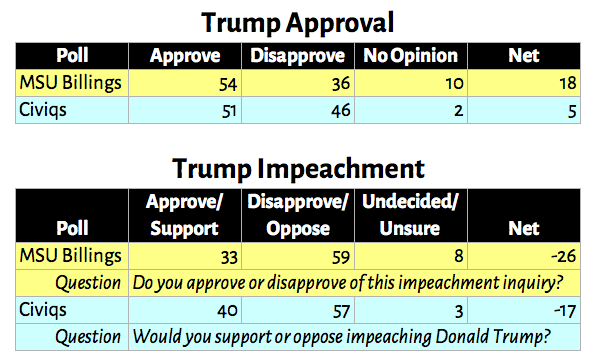30 October 2019 — 0830 mdt
KXLH's story omits poll’s flaws
Don’t trust the MSU Billings poll of the
Montana Democratic U.S. Senate primary
A poll of an election, especially a primary election, almost always should include all of the candidates who have filed for the office. The poll just released by Montana State University at Billings did not include two major candidates for the Democratic nomination for the U.S. Senate, and therefore provides perishing little useful information on the subject.
First, some notes on the poll, now known as the Mountain States Poll. Then, the details of how the Democratic senatorial primary question was bungled.
The methodology was sound, but the sample was small. For Montana, the poll’s sampling margin of error is 6.7 percent.
The Mountain States Poll was conducted from October 7-12, 14, and 16, 2019, in the Market Research Lab on campus. Students enrolled in PSCI 342: Media, Public Opinion, PSCI 220: Introduction to Comparative Government, and BMKT 436: Sales and Sales Marketing served as telephone surveyors for the poll.
♦ ♦ ♦ ♦ ♦
This report summarizes the results of a statewide random sample of 215 adult residents of Montana and 177 adult residents of Wyoming identified as likely voters. Approximately 82 percent of the survey respondents were contacted via cellphone and 18 percent were contacted on landline telephone numbers.
♦ ♦ ♦ ♦ ♦
The sample was weighted for sex, age, race, age, and education based on Census Bureau estimates of the voting-age population in Montana and Wyoming, and for party affiliation for Wyoming respondents based on data provided by the Wyoming Secretary of State’s office.
Because the Mountain States Poll assessed President Trump’s performance and support for the U.S. House of Representative’s inquiry into impeaching him, I was able to cross-check the poll against the online polls on those subjects conducted by Civiqs, whose polls for Montana have an MOE of approximatly 3–4 percent.

Both polls report essentially the same values for Trump’s job approval, and for opposition to the impeachment inquiry, but differ, probably statistically significantly, on job disapproval, support for impeachment, and the size of the undecided bloc. Thus, the Mountain States Poll reports a much higher net job approval rating, and a somewhat higher net opposition to impeachment.
At least on these questions, the Civiqs poll appears to validate the Mountain States Poll’s accuracy, with some caveats.
MSP omits major Democratic senatorial candidates
Four declared candidates for the Democratic nomination for the U.S. Senate who have filed with the Federal Election Commission: Wilmot Collins (13 May 2019), John Mues (11 July 2019), Cora Neumann (1 October 2019), and Michael Knoles (26 September 2019). A fifth, Jack Bradley, filed but withdrew for health reasons. All filed and announced well before the MSP started calling voters.
And all but Collins were excluded from the question. But Steve Bullock, who’s running for President and strongly maintains will not run for the U.S. Senate, was matched-up with Collins and Mr. Undecided. The results: Bullock, 59 percent; Mr. Undecided, 39 percent; Collins, one percent.
Is that useful information? Not to my mind. I think the poll should have listed Collins, Mues, Neumann, Knoles, and no preference. One can make a case for including Bullock providing those polled are asked to rank their choices, but no one can make a remotely plausible for omitting Mues, Neumann, and Knoles.
Tom Winter omitted from list of Democratic U.S. House candidates
Winter is not a Tommy come lately. He filed with the FEC on 2 April 2019, and has raised far more money, and done much more campaigning, than Matt Rains, who, along with Kathleen Williams, was listed as a candidate. The results: Williams 69 percent; Rains, six percent; undecided, 25 percent. Omitting Winter makes that question worthless.
Making matters worse, the poll lists all of the candidates for the Republican primary for the U.S. House.
It’s fair to ask whether omitting Mues, Nuemann, Knoles, and Winter, was just inexplicable blundering, or whether it was a deliberate attempt to rob the public of useful information on the Montana Democratic primaries for Congress.
KXLH fails to report that the poll omitted Mues, et al
Written by Mitch Lagge, KXLH TV’s report on the poll flags Bullock’s 59 percent, and notes that Bullock consistently demurs interest in running for the U.S. Senate, but fails to report that the poll omitted major Democrats from its list of candidates for the senate and house primaries.
